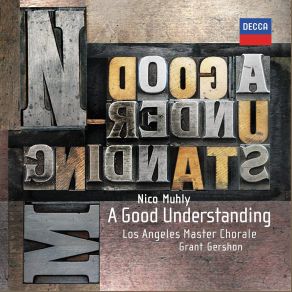Muhly: A Good Understanding
Download links and information about Muhly: A Good Understanding by Los Angeles Master Chorale, Grant Gershon. This album was released in 2010 and it belongs to Classical genres. It contains 12 tracks with total duration of 01:04:22 minutes.

|
|
|---|---|
| Artist: | Los Angeles Master Chorale, Grant Gershon |
| Release date: | 2010 |
| Genre: | Classical |
| Tracks: | 12 |
| Duration: | 01:04:22 |
| Buy it NOW at: | |
| Buy on iTunes $9.99 | |
| Buy on iTunes $7.99 | |
Tracks
[Edit]| No. | Title | Length |
|---|---|---|
| 1. | Bright Mass With Canons: I. Kyrie | 3:24 |
| 2. | Bright Mass With Canons: II. Gloria | 4:11 |
| 3. | Bright Mass With Canons: III. Sanctus | 2:45 |
| 4. | Bright Mass With Canons: IV. Agnus Dei | 3:09 |
| 5. | First Service: I. Magnificat | 5:19 |
| 6. | First Service: II. Nunc Dimittis | 2:50 |
| 7. | Senex Puerum Portabat | 7:13 |
| 8. | A Good Understanding | 6:30 |
| 9. | Expecting the Main Things from You: I. I Hear America Singing | 10:57 |
| 10. | Expecting the Main Things from You: II. A Farm Picture (Interlude) | 4:46 |
| 11. | Expecting the Main Things from You: III. Poets to Come | 7:28 |
| 12. | Like As the Hart | 5:50 |
Details
[Edit]Nico Muhly is known both as a classical composer and as an arranger who’s worked with pop acts such as Björk, Grizzly Bear, and Antony & The Johnsons. His 2008 release, Mothertongue, with its combination of minimalism, folk, electronica, and other elements, is hard to place stylistically. But A Good Understanding focuses on another dimension of Muhly’s musical personality: the lover and composer of choral music. Musical director Grant Gershon and the Los Angeles Master Chorale perform six of the young artist’s works on this thoroughly enjoyable album. It’s not only the vocal music that shines here: percussion and organ bring interesting textures and rhythms to the title cut, and “Senex Puerum Portabat” features striking brass writing that nicely contrasts with the choir. “Expecting the Main Things from You” compellingly sets the poetry of Walt Whitman to music. The first movement’s percussive effects, which lean toward the programmatic, lend color to the overall sound. After a quiet interlude, forceful, minimalist rhythms appear in the third section, before the piece closes with celestial vocals, bells and strings.